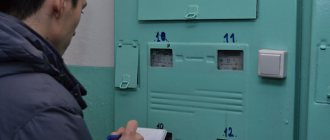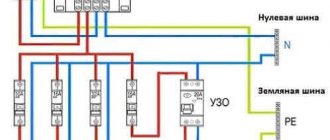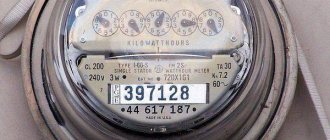Electricity Shutoffs for Non-Payment Law 2020
In the housing and communal services sector, there are a number of regulations according to which utility services must be provided to the population uninterruptedly and with high quality.
In turn, homeowners – consumers of services – are obliged to pay for them in a timely manner and in full. Supply organizations cannot refuse to supply resources necessary for the lives of citizens (water, gas, electricity) without compelling reasons. But the legislator has determined cases when they have the right to limit or stop their supply.
The regulatory basis for turning off electricity is the Decree of the Government of the Russian Federation No. 354 and No. 442, which states that the contractor (an organization providing services in the housing and communal services sector), if there are legal grounds, terminates or suspends the provision of unpaid services.
https://www.youtube.com/watch?v=https:Qmfzhg7536o
The service provider is a party to the electricity supply contract.
The supplier of electricity to apartment buildings and private buildings is the energy supply organization with which an agreement has been concluded for the supply of the resource.
Most often, contracts for apartment buildings are concluded by management companies, and for private houses - directly by consumers.
Frequent power outages: how to deal with such cases
Emergency operations are automatically performed by emergency control devices. Private unscheduled outages on this basis indicate the unsatisfactory performance of the energy supply organization, the incompetence of its management and (or) specialists assigned to the house (neighborhood).
We recommend reading: How to sell an apartment with a mortgage and buy another one with a mortgage
Moral damage caused to the consumer as a result of violation by the manufacturer (executor, seller, authorized organization or authorized individual entrepreneur, importer) of consumer rights provided for by the laws and legal acts of the Russian Federation regulating relations in the field of consumer rights protection is subject to compensation by the causer of harm if he is at fault. The amount of compensation for moral damage is determined by the court and does not depend on the amount of compensation for property damage.
Responsibility for illegal shutdown
Illegal blackouts can only be proven in court. If your supplier turns off your power, it is likely that he is confident that his actions are legal or he feels impunity.
If you are sure that your electricity was cut off illegally, we recommend that you contact a professional lawyer for help, after which you can go to court with your electricity supplier.
Important! The legislation of the Russian Federation also provides for criminal liability of the supplying company for unlawful shutdown of electricity, but only in cases where the shutdown leads to huge material losses for the consumer.
Types of illegal power outages:
- Turning off the lights without good reason.
- Power outage for more than 24 hours at a time.
- Power outages for 72 hours or more per year (total).
- Power outage due to hostilities.
- Power outages before the holidays (unless it's an emergency).
- Turning off the lights due to “debts” by mistake
The reasons for a power outage in a private home can be different. The grounds for this are repair work, emergencies, arrears in payment for this service, as well as unauthorized connection to the power transmission network.
When carrying out scheduled repairs, the power supply organization may turn off the electricity supply, but not for longer than 24 hours continuously.
This clause is usually found in the electricity contract, which also stipulates the total duration of the planned outage per year, usually 72 hours. Before carrying out work, the consumer must be notified of a power outage.
Emergency situations
If the power supply system is completely or partially out of order, then this is an emergency. In such cases, the electricity is turned off without warning (but with subsequent notice) and for an indefinite period until the breakdown is repaired.
For non-payment
The consumer is obliged to pay for the electricity received on time; this is the main subject of the electricity supply contract. If a subscriber violates his payment obligations within 2 months, the electricity supply organization can disconnect him from the power grid, but only after taking all preventive measures.
Unauthorized connection to the power transmission network is illegal; the power supply organization has the right to disconnect such consumers immediately after notification. It can act in the same way in the event of detection of unaccounted consumption points, gross violation of the terms of the electricity supply contract, unsatisfactory condition of the consumer's networks and electrical equipment, which can lead to an emergency.
The fulfillment of contractual obligations between the electricity supplier and the consumer is regulated by Decree of the Government of the Russian Federation No. 442 of May 4, 2012. The document approves the rules for stopping power supply, as well as legal grounds for turning off power, which can be divided into three groups.
By default, an electricity supply contract is concluded for an indefinite period, unless otherwise specified. The reasons for its termination are as follows:
- Entering a restriction mode at the request of the consumer. For example, the owner does not want to pay for electricity in a room that no one uses. The user sends a request to the organization with which an agreement has been concluded for the supply of the resource. Within one day, it is transferred to the contractor, who will turn off the power supply.
- The expiration of the temporary power supply scheme or the appearance of a reason for early disconnection from the network. This scheme is used mainly on construction sites and is valid for 12 months.
- Termination of the agreement for the supply of resources by agreement of the parties. The restriction is introduced 3 business days after the service provider receives information about the termination of the contract.
Before terminating the contract, the consumer is obliged to pay for the supplied resource.
We suggest you read: Tax deduction when buying a car on credit
Power supply systems operate around the clock and require constant monitoring of their condition, as they are a high source of danger. Ensuring their normal operation and maintaining safety sometimes requires stopping the supply of resources; the need arises in the following cases:
- Discovery by a supplier's representative of an unsatisfactory technological condition of the user's electrical installations, which increases the risk of an accident or threatens people's lives. The decision to disconnect is made by a representative of Rostechnadzor. Before entering the restriction mode, the subscriber is notified in advance.
- Threat or emergency. The law does not regulate the time frame for eliminating the consequences. To minimize damage due to an accident, if the lack of electricity can cause serious and irreversible problems, an agreement on technological and emergency protection is drawn up with the energy supply company. The document defines the minimum load value that ensures normal operation of electrical equipment.
- Planned repairs. The terms and time of work are specified in the contract. Approved by the RF PP dated December 27, 2004 No. 861 “Rules for non-discriminatory access to services for the transmission of electrical energy and the provision of these services” in paragraph 31 (6) establish a limit on the permissible time for limiting power supply: up to 24 hours at a time and no more than 3 days at a time year.
Timely detection and repair of faults contribute to continuous power supply.
Unscrupulous consumers may find themselves without power supply by not fulfilling the terms of the contract or by breaking the law. Reasons for disconnection are:
- The presence of a legal requirement of a bailiff to limit the supply of a resource. It is introduced immediately or on the day established in the court decision, of which the initiator is obliged to notify the consumer.
- Detection of the fact of unauthorized connection to the network (non-contractual consumption). Disabling is carried out immediately or, if additional measures are required, no later than 3 days from the moment the violation is detected.
- Unaccounted resource consumption (theft). Disconnection from the network is carried out as soon as information about a violation is received. No prior warning to the offender is required.
- Payment arrears for more than three months. The debt is calculated based on consumption standards, not meter readings. The restriction is introduced at the request of the resource provider with mandatory compliance with the legal order: notifying the subscriber of the applied sanctions 30 days in advance and drawing up an act on the day of deactivation. The document is drawn up in the presence of the debtor or two uninterested persons. Refusal to acknowledge a debt is not an obstacle to the application of sanctions.
You can notify about the disconnection in any available way: inform in person (by SMS, in a payment receipt, by letter with notification), publish a message on the company’s website or in the media.
If it is established that a consumer has violated the power supply limitation regime, the authorized company disconnects it from the network immediately.
According to clause 20 of the Rules for complete and (or) partial limitation of power consumption, approved by the RF Government on May 4, 2012 No. 442, measures to limit and connect the power supply are carried out on a paid basis. If the disconnection is declared illegal, the contractor has no right to demand compensation.
https://www.youtube.com/watch?v=ytcopyrightru
Liability for illegally limiting power supply depends on the extent of the damage caused. The subscriber has the right to demand compensation for moral and material compensation.
Occurs in situations where shutdown without following a legal procedure has led to a malfunction of electrical equipment and is the cause of its breakdown.
Illegal actions of an official can be regarded under Art. 19.1 of the Code of Administrative Offenses of the Russian Federation as arbitrariness and is punishable by an administrative fine.
If the lights are turned off frequently, then the organization or official responsible for supplying the resource may be subject to penalties under Art. 7.23 of the Code of Administrative Offenses of the Russian Federation for violation of standards for providing the population with public utilities.
Since the energy sales company is a natural monopolist in the energy market, unlawful actions can be punished by imposing a fine on the responsible persons under Art. 14.31 Code of Administrative Offenses “Abuse of a dominant position in the product market.”
We suggest you read: Is it possible to discharge a minor child from a first marriage from a municipal apartment?
Compensation for moral damage can be demanded by referring to Art. 15 Federal Law “On the Protection of Consumer Rights”. The law applies to situations where electricity is used for personal purposes.
Illegal power outages can be regarded as arbitrariness and be prosecuted under Article 330 of the Criminal Code of the Russian Federation. The person responsible for interrupting the supply of electricity shall be fined or sentenced to correctional labor, arrest or imprisonment if violence was used or there was a threat of violence.
According to paragraph 1 of Art. 215.1 of the Criminal Code of the Russian Federation, if the illegal shutdown resulted in major damage, serious harm to health or other consequences, the official will be punished with a fine, correctional labor or imprisonment.
If unlawful actions led to the death of a person, the proper person will be held accountable under clause 2 of Art. 215.1 of the Criminal Code of the Russian Federation. Possible penalties will be: forced labor with deprivation of the opportunity to work in a certain position or engage in certain activities, or imprisonment.
Sample complaint about illegal power outage
The illegal actions of the board of SNT "Lenproekt" caused me and my family significant material and moral damage: Currently, my grandson's wife and my granddaughter with infants (3 months and 6 months) are deprived of the opportunity to live at my summer cottage in the summer. In addition, the nervous shock caused by the illegal power cut seriously undermined my health. As a result of what happened, my family is experiencing moral suffering and financial difficulties associated with the need to pay for additional medications, the purchase of an electric generator, gasoline for it, the constant moving of infants associated with the impossibility of living in a summer cottage, as well as other moral, material and ethical suffering.
I didn't receive a warning. These actions of the board of SNT "Lenproekt" grossly violated the law and my rights as a consumer and citizen. Within the meaning of Art. Art. 546, 523 of the Civil Code of the Russian Federation, unilateral refusal to execute an energy supply contract is possible only in relation to a legal entity. In relation to SNT "Lenproekt" I am a sub-subscriber, and therefore the defendant did not have sufficient grounds to turn off the electricity to my country house.
This is interesting: Volgograd youth housing program
Reasons for turning off the lights for non-payment of utilities
1. The occurrence of cases beyond the control of the consumer. This may include:
- planned preventive measures carried out on networks;
- accident elimination;
- breaks in power supply lines due to natural disasters, emergencies, etc.
2. Occurrence of cases depending on the consumer:
- refusal to pay for the consumed resource and the occurrence of debt;
- improper use of devices, which can lead to emergency situations;
- unauthorized connection;
- connecting electrical appliances exceeding the maximum permissible power;
- any violation of the contract.
Most often, a shutdown or suspension of electricity supply to an apartment or house occurs due to accumulated debt. At the same time, the service provider has the right to turn off the lights if there is a debt for consumed electricity, if the payment has not been paid for more than two months (clause 118 of PP No. 354).
This norm is enshrined in legislation and cannot be changed by the contractor independently.
— Can electricity be turned off for non-payment without a court decision?
Yes they can! To turn off electricity, you do not need a court decision, but only need to notify the defaulter on time and follow the procedure for turning off the lights.
Art. 119 in Resolution No. 354 provides for a strict procedure for cutting off electricity in case of non-payment within 20 days. Therefore, the performer must adhere to the procedure in order for the actions to be recognized as legal. At the slightest non-compliance, the consumer has the right to file a complaint against the actions of the contractor to the supervisory authorities or court. If the actions are found illegal, the performer will be required to pay a fine.
How to write a complaint against the Criminal Code?
Sample complaint against Energosbyt to the prosecutor's office for illegal blackouts
1. Before disconnecting, a notification must be sent to the defaulter by any of the following methods:
- delivery in person against signature;
- by registered letter with notification, and the fact of receipt will be reflected in the notification.
2. Then the debtor is given 20 days, during which the debtor is obliged to repay the debt.
3. If payments are not received, at the end of the established period, a restriction on electricity consumption is introduced for 10 days. Then it is turned off.
4. If limited supply of light is not possible, electricity will be turned off after 30 days of non-payment. In this case, harm to everyone living in the house must be excluded, and damage to common property must also be prohibited.
At the moment of termination or limitation of the supply of a resource, an official document is drawn up - a power outage act, which indicates:
- date of actions taken;
- consumer data;
- address of the housing being disconnected;
- how the shutdown was made;
- meter readings indicating its number;
- grounds for stopping or limiting the supply of electricity;
- shutdown period.
An act is drawn up in three copies and after signing, one of them is handed over to the consumer.
Complaint about Power Outage Sample
If the consumer received a warning about a power outage late or did not receive it at all, then this is a violation of the existing procedure for introducing restrictions and the consumer has the right to demand compliance with the law. If the law is not observed, he has the right to file a complaint regarding a power outage to consumer rights protection authorities, the Federal Antimonopoly Service, the housing inspectorate or the prosecutor's office.
According to him, the volume of undersupply of electricity on days of outages is approximately 125 million kWh, which is actually very little, since the standard volume of supply in MOESK is 73 billion kWh per year. Therefore, A. Konovalov noted, he does not expect claims for large sums.
When disconnection is illegal
Disconnecting a consumer from the power grid is legally carried out in compliance with all rules. However, there are often situations when limiting the supply of electricity is illegal.
- Housing and communal services do not have the right to turn off electricity for non-payment of utilities if there is no debt directly for electricity.
- Shutting off in the presence of debt is impossible in winter in houses that, according to technical documentation, are heated by electrical appliances.
- According to Art. 38 Federal Law “On Electric Power Industry”, rolling restrictions on the mode of electricity consumption are prohibited. This means that turning off the electricity to a defaulter should not affect the rights of his bona fide neighbors. The energy supply company is obliged to provide the ability to individually enter a power supply limitation mode.
- Each subject of the Russian Federation annually, before July 1, establishes a list of electricity consumers whose lack of power supply will entail economic, social or environmental consequences. For example, the owner can provide a certificate of residence on the territory of a seriously ill person whose vital functions depend on devices connected to the network, or a small child who requires special nutrition.
- The procedure for introducing a mode to limit the supply of electrical energy was violated.
- Power outages for scheduled repairs occur frequently and exceed the permissible limitation time.
- Power supply was not restored within 48 hours from the date of provision of a certificate of debt repayment or restructuring.
The fact of disconnection is confirmed by the signatures of the neighbors. If possible, you need to invite a representative of the company responsible for supplying the resource and create a special commission that will draw up a violation report.
We invite you to read: How to find out the transport tax on a car by the owner’s last name online in 2021?
Complaint about permanent power outage sample
However, clause 15 of the rules for the full and (or) partial mode of limiting electricity consumption contains a list of mandatory information that must be contained in a warning about a power outage. Here is a list of this information, which must contain a sample notice of power outage: 1. Name of the consumer and point of delivery in respect of which a power outage (limitation of consumption mode) of electricity is introduced; 2.
I regularly fulfill the obligations assigned to me by the Housing and Civil Codes of the Russian Federation to pay for housing and communal services. Parts 1 and 4 art. 9.16 of Federal Law No. 152-FZ “On Personal Data” provides only the written consent of the citizen “On the provision of their personal data, their processing, etc.” In accordance with Part 2 of Art. 1 of the Civil Code of the Russian Federation, citizens (individuals) and legal entities acquire and exercise their civil rights of their own will and in their own interest.
Where to go to connect electricity
You can apply for restoration of power supply only after the debt has been fully repaid. Alternatively, it is possible to reach an agreement with the contractor to provide payment in installments. Connecting the light is a service that you will have to pay for.
To connect the light back you need:
- Contact the service organization (for example, OEC), you can find it in the receipt.
- Pay for the service of restoring electricity, costing about 600-800 rubles.
- Within 2 days, an electrician must come and remove the seal (ab. 9, clause 120 of PP No. 354).
Complaint about permanent power outage sample
Decree of the Government of the Russian Federation dated May 6, 2011 N 354 “On the provision of utility services to owners and users of premises in apartment buildings and residential buildings” states the following: “the contractor has the right to suspend or limit the provision of utility services 1 month after a written warning (notification) of the consumer in case of incomplete payment by the consumer for utility services."
The Civil Code prohibits interruptions in the supply of electricity, including in the case of non-payment. That is, even if you don’t pay, they cannot turn off the electricity. only by agreement of the parties, which does not exist in your case. Therefore, now you have grounds to file a complaint against the actions of the Criminal Code to the housing inspectorate or the prosecutor's office.
Where to complain
If it turns out that turning off the lights is illegal, you need to draw up 2 sample complaints in any form. It contains information about the consumer, the supply agreement, the date and time of the illegal disconnection and its consequences. The claim is sent to the supply company: management company, homeowners association, or directly to energy sales. If your request is ignored, you can file a complaint:
- to the district administration;
- to Rospotrebnadzor;
- to the prosecutor's office.
A claim for violation of the rules for the provision of utility services is sent by registered mail with notification or taken personally to the company’s office and submitted against signature. The answer should come within a month.
https://www.youtube.com/watch?v=upload
In the claim, indicate the reasons why the actions to limit the supply of light were illegal, citing the relevant articles of the law, and the consequences of the lack of power supply.
The legislation of the country clearly defines the grounds and procedure for disconnecting electrical energy. Turning off the lights without warning or obvious reasons causes inconvenience and indignation on the part of the consumer. In these situations, the law sides with the citizen and gives him the opportunity to defend his rights in court.
Complaint against housing and communal services for power outage
It is important to know! The procedure may differ depending on the chosen method of managing the house and common property. It will not be normal to turn off electricity without warning, as this may lead to complaints from consumers. An abrupt shutdown can lead to property damage, and residents have the right to complain and demand compensation for damage incurred due to equipment damage.
- check home meters (the reason may lie in a short circuit);
- check the shield on the site;
- contact the control room of the utility service or the chairman of the HOA;
- call the housing and communal services energy saving organization;
- call temporary information services (telephone numbers are indicated on information stands).
What other penalties are there for non-payment?
Shutting off electricity is one of the measures to combat non-payers for utility services. Other measures may also apply to them:
- Peni. For non-payment of any of the housing and communal services, the contractor has the right to charge penalties. It is accrued after 90 days, during which debts accumulated. This means that from the 91st day an amount of 1/130 of the refinancing rate established by the Central Bank of the Russian Federation will be accrued daily. You can check the calculation of charges in a convenient online calculator.
- Eviction. Applies only to those residents who occupy municipal housing space on the basis of a social tenancy agreement and have not paid utility bills for more than six months. At the same time, if at least part of the payments are made or there are valid reasons, eviction is not applied. This measure can only be used on the basis of a court decision.
In general, it is impossible to disconnect a consumer from electricity for non-payment of other utility bills. The debt is calculated for each specific service and the measure of restriction or disconnection is applicable only for it. This means that if there is a water debt, only the water can be turned off.
https://www.youtube.com/watch?v=https:accounts.google.comServiceLogin
If the consumer currently has a difficult financial situation that does not allow him to pay for electricity in full, he must contact the management company or the resource supplier (depending on who the contract for the supply of energy is concluded with) for an installment payment plan. Typically, such installments are provided for a period of six months. This will avoid a power outage in the apartment.
Power outage
At the beginning of September 2003, representatives of the 5th city branch (Energosbyt Mosenergo, Moscow, Rezervny pr-d., 8/2) (hereinafter referred to as Mosenergo) contacted me by phone and offered to pay the outstanding payment for services in in the amount of 5239 rubles. 16 kopecks I paid the specified amount of debt on September 24, 2003 through Sberbank and on the same day I reported this by phone to Mosenergo. My message was accepted and no complaints were expressed. On October 7, 2003, when I returned home at 1 p.m., I discovered that the electricity in my apartment had been turned off. As an explanation for what happened, I was given task No. 5425 dated September 26, 2003, in which it was ordered to turn off the electricity in our apartment on October 7, 2003. By 19:00 the master I called for 300 rubles. connected the electricity.
On October 8, 2003, the day after this incident, we found in our mailbox a letter from Mosenergo, sent on October 2, 2003 and received at our post office on October 7, 2003. This letter contained a warning dated September 10, 2003. No. 5, where it was said that if the debt is not paid by September 19, 2003, our electricity will be turned off after September 22, 2003 without additional warning. According to paragraph 3 of Art. 546 of the Civil Code, a break in the supply, cessation or limitation of the supply of electricity without the consent of the subscriber and without appropriate warning is allowed if it is necessary to take urgent measures to prevent or eliminate an accident in the system of the energy supplying organization, subject to the immediate notification of the subscriber about this. We received the warning the day after the shutdown! And, of course, the shutdown was not related to the accident, but was intended to punish us. Although by October 7 we had already paid for electricity for two weeks and notified Mosenergo about it.
This is interesting: Do Labor Veterans of the Vladimir Region Have the Right to a 50% Discount on Electric Trains in the Moscow Region
Complaint about Power Outage Sample
2. In issuing the “Resolution to refuse to initiate a criminal case”, district investigator Kuzheev P.V. writes that, according to a certificate from the Pavshino Management Company LLC, issued to him during the inspection, it follows that the circuit breakers and RCDs are the common property of a certain Pavshino HOA, and he has not received any statements from the victim - the Pavshino HOA regarding theft.
This is interesting: The house was built 18 years ago, close to the border of the plot
1. In court, the UO presented a demand for payment for electricity for the period when I was disconnected and the meter was sealed. Is this legal? From the documents there is only an order from the prosecutor's office that the fact of the shutdown was confirmed; the UO does not have any acts on disconnection and activation.








